Opening a massage parlor or spa in Singapore requires clearing this hurdle first.
A recent large-scale operation by Singapore’s police force serves as a stark reminder to all aspiring operators in the local massage and spa industry: operating legally is the primary rule for long-term survival.
Between February and April this year, Singapore’s Police Force (SPF) conducted surprise inspections at 181 traditional Chinese medicine clinics island-wide. The investigation uncovered 11 clinics illegally providing massage services, with one female employee arrested on prostitution charges.
This crackdown sent shockwaves through the industry, forcing entrepreneurs to confront a harsh reality: operating a massage parlor or spa in Singapore without proper licensing risks ending your business before it even begins—through fines, imprisonment, or even caning.
This is far from an isolated incident. Some seemingly ordinary neighborhood massage parlors were caught red-handed by police for “transaction swapping” schemes: using physical premises to attract customers while conducting actual services elsewhere to evade enforcement.
Regrettably, with 4,020 officers deployed across 1,230 raids involving over 14,000 investigations, offenders found nowhere to hide.
This demonstrates that operating a massage or spa business in Singapore is not a matter of “just doing it.” Complying with regulations not only protects the business owner but also safeguards the legitimate rights and interests of customers. Below, we guide you through case studies, regulations, and operational procedures to comprehensively understand how to legally establish a massage parlor or spa in Singapore.
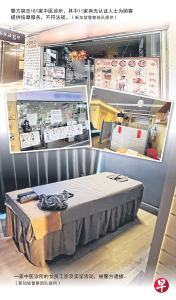
Source: Lianhe Zaobao

I. Why a License?
Endless Cases of Failure
In Singapore, if you wish to open a massage parlor or spa, the first step is to understand the importance of licensing. Otherwise, you may become the next headline.
Case 1: The Gray Area of Traditional Chinese Medicine Clinics
Some clinics operate under the guise of “traditional Chinese medicine” while actually providing massage services. The problem arises when massages are performed not by the registered TCM practitioner themselves, but by other staff members. In such cases, a Massage Establishment license (ME license) must be obtained. Operating without this license constitutes illegal business activity.
During this operation, police discovered that most of the 11 non-compliant clinics violated this rule: the TCM practitioner might only be a nominal figurehead, while the actual massage therapists lacked any certification. Ultimately, the relevant employees were arrested, and the clinics faced hefty fines or even closure.
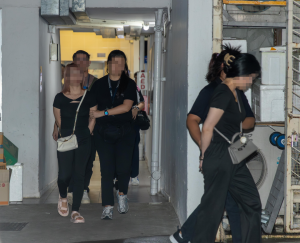
Source: Lianhe Zaobao
Case 2: Neighborhood Massage Parlors’ “Venue Switching” Scheme
To evade police inspections, some massage establishments covertly altered their operations: the storefront served only as a reception area, while actual services were relocated to other sites. This seemingly clever maneuver ultimately led to their detection by authorities.
The scenes were shocking: in a small shop with five beds, dimly lit, masseurs and customers were lined up for questioning; another two-story shop featured private rooms with bathrooms on the upper floor, yet it too fell under enforcement.
This island-wide crackdown investigated 2,445 individuals aged 15 to 84, with 932 arrested. This demonstrates that no matter how “innovative” the methods, illegal activities find no foothold in Singapore.
Case Three: The Heavy Price of Operating Without a License + Indecent Assault
Beyond operating without a license, illegal activities can also lead to criminal charges. For instance, a masseuse who made inappropriate contact with a customer without consent was sentenced to 11 months’ imprisonment and three strokes of the cane. This isn’t a movie plot—it’s a real-life case.
Caning is a legal punishment in Singapore, administered with a rattan cane that can cause skin lacerations and bleeding. It must be carried out strictly according to procedure.
In summary, Singapore’s massage and spa industry faces stringent regulation. Violators risk not only hefty fines but also criminal liability, including caning. Operating legally is the only sustainable path forward.
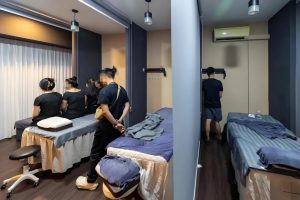
Source: Lianhe Zaobao

II. How to Apply for a Massage License?
A Step-by-Step Guide to Opening Your Business
Now that you understand the importance of licensing, how do you apply? Here we introduce the ME License (Massage Establishment License), the essential “passport” for operating a legal massage establishment.
1. What is an ME License?
Under Singapore’s Massage Establishment Act, any activity involving kneading, manipulation, or massage of the human body falls under the scope of massage. This excludes services like manicures, pedicures, phototherapy, electrotherapy, sauna sessions, and bathing that do not involve body massage.
Certain exemptions apply, such as:
① Offering general public massage without any partitioned or private spaces;
② Providing solely head or scalp massage;
③ Exclusively massaging children under 12 years old;
④ Massage administered by registered Chinese medicine practitioners or other licensed professionals.
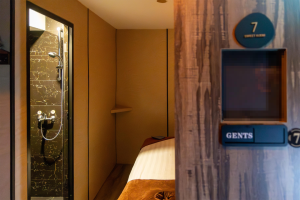
Source: Lianhe Zaobao
2. Two Types of ME Licenses
① Category 1 License
Operates in HDB shops, hotels, or shopping malls;
Area ≥ 100 sq ft;
Operating hours: 7:00 AM–10:30 PM;
Staff must be CaseTrust certified.
② Category 2 License
Must be located away from residential areas, schools, and places of worship;
Area ≥ 50 sq ft;
Operating hours: 10:00–22:30;
Staff must be Singapore citizens, permanent residents, or Malaysians holding valid work passes.
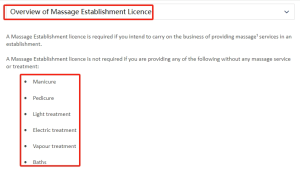
Source: Singapore SPF
2. Application Requirements
Applicants must be at least 21 years old;
Have no criminal record;
Be the business owner (sole proprietor, partner, or company manager);
Foreign applicants must hold valid work permits;
At least 80% of employees must hold PLRD certification, with the remaining 20% required to obtain certification within 6 months;
Employees must wear uniform attire;
Rooms must remain unlocked with all room numbers clearly displayed;
No alarm systems may be installed to alert law enforcement;
Advertisements must not contain indecent content.
3. Application Process
Register the company: Register the business with ACRA;
Prepare Documents: Include company profile, CaseTrust certification, employee uniform photos, floor plan, URA or HDB approval documents, renovation and asset inventory, employee qualification certificates, etc.;
Submit Application: Via the police PLRD system;
Approval Time: Approximately 21 working days;
Validity Period: Up to 3 years maximum, renewal required upon expiration.
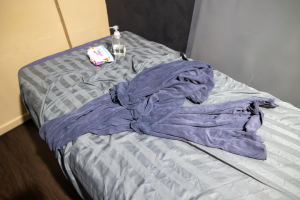
Source: Lianhe Zaobao

III. What’s the Difference Between SPA and Massage?
Many mistakenly equate SPA with beauty or skincare services. However, any establishment offering body massage must obtain an ME license.
1. Distinctive Features of SPA
Facilities providing only skincare, manicures, phototherapy, etc., without massage services, do not require an ME license.
SPA establishments incorporating massage are essentially “enhanced massage parlors” subject to stricter regulations.
2. Additional Requirements
Rooms must not be fully enclosed to prevent covert activities;
Soundproof doors or hidden doors are prohibited;
Staff must hold internationally recognized certifications (CIDESCO, CIBTAC, ITEC, etc.);
Advertising must adhere to healthy and standardized guidelines;
License holders must conduct daily staff training to ensure no sexual services are provided.
Overall, SPA facilities face stricter spatial design and staff qualification requirements to prevent illegal activities and protect customer safety.
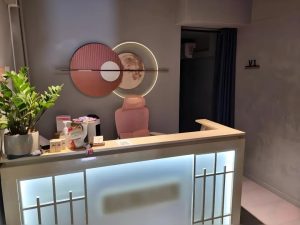
Source: Lianhe Zaobao

IV. From an Entrepreneur’s Perspective:
Industry Opportunities and Compliance Challenges
Despite stringent regulations, Singapore’s massage and spa market remains full of opportunities.
1. High Market Demand: Singapore’s fast-paced lifestyle drives demand for relaxation and wellness among residents and tourists.
2. Cultural Diversity: Services like Chinese Tuina, Thai massage, and Japanese spa treatments all have market appeal.
3. Compliance Costs: License applications, staff training, facility renovations, and periodic inspections all constitute operational expenses for lawful businesses.
4. Potential Risks: Unlicensed operations not only violate the law but may also lead to criminal charges.
Recommendations:
– Preemptively understand ME license requirements and spa regulations.
– Hire certified staff and train them in standardized procedures.
– Maintain bright, safe, and transparent business environments.
– Ensure advertising promotes health standards without sexual innuendo.
Ultimately, legality is the industry’s only sustainable path forward.
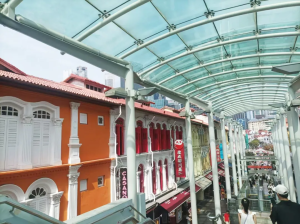
Photo/Singapore’s Chinatown district
Conclusion: Legality is the Only Passport
Singapore’s massage and spa industry teaches us a lesson: Gambling on luck only invites risk; lawful operation is the enduring path.
From TCM clinics and neighborhood massage parlors to spa establishments, every violation serves as a reminder to entrepreneurs: A license isn’t just a certificate—it’s a “passport” safeguarding both your business and your customers.
If you wish to operate in Singapore’s massage or spa sector, remember these three principles:
Apply for an ME license—whether running a massage parlor or spa, any massage service requires certification.
Train staff with internationally or locally accredited qualifications.
Ensure transparent management: space layout, advertising, and service procedures must comply with regulations.
Legality is not just a responsibility—it is the sole guarantee for sustainable growth in Singapore’s massage and spa industry.
Note: Information sourced from Singapore’s SPF, ACRA, URA, HDB, GoBusiness, CaseTrust, Lianhe Zaobao, and compiled from news reports. Reproduction requires attribution; contact for removal if infringing…….
